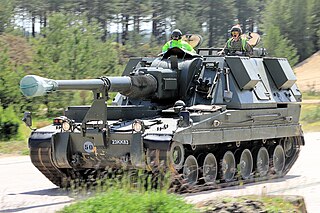
The AS-90, known officially as Gun Equipment 155 mm L131, is an armoured self-propelled artillery used by the British Army.

The Panzerhaubitze 2000, meaning "armoured howitzer 2000" and abbreviated PzH 2000, is a German 155 mm self-propelled howitzer developed by Krauss-Maffei Wegmann (KMW) and Rheinmetall in the 1980s and 1990s for the German Army. The PzH 2000 has automatic support for up to five rounds of multiple round simultaneous impact. Replenishment of shells is automated. Two operators can load 60 shells and propelling charges in less than 12 minutes. The PzH 2000 equips the armies of Germany, Italy, Ukraine, Netherlands, Greece, Lithuania, Hungary, Qatar, and Croatia, mostly replacing older systems such as the M109 howitzer.

The 2S19 Msta-S is a 152.4 mm self-propelled howitzer designed and manufactured by Uraltransmash in the Soviet Union and later in Russia, which entered service in 1989 as the successor to the 2S3 Akatsiya. The vehicle has the running gear of the T-80, but is powered by the T-72's diesel engine.

The M114 is a towed howitzer developed and used by the United States Army. It was first produced in 1942 as a medium artillery piece under the designation of 155 mm Howitzer M1. It saw service with the US Army during World War II, the Korean War, and the Vietnam War, before being replaced by the M198 howitzer.

Zuzana 155 mm Gun Howitzer is a Slovak artillery system developed by Konštrukta – Defence, with a 45-caliber gun and automatic loader for loading of both projectile and charge. It is an evolution of the 152mm SpGH DANA self-propelled howitzer.

The Camion Équipé d'un Système d'Artillerie or CAESAR is a French 155 mm, 52-caliber self-propelled howitzer that can fire 39/52 caliber NATO-standard shells. It is installed on a 6x6 or 8x8 truck chassis. Equipped with an autonomous weapon network incorporating an inertial navigation system and ballistic computer, the CAESAR can accurately strike targets more than 40 kilometres (25 mi) away using "Extended Range, Full Bore" (ERFB) ammunition with base bleed, or targets over 55 kilometres (34 mi) away using rocket-assisted or smart ammunition.

The DANA (Dělo automobilní nabíjené automaticky is a wheeled self-propelled artillery piece. It is also known as the Samohybná Kanónová Húfnica vzor 77. It was designed by Konštrukta Trenčín and built by ZTS Dubnica nad Váhom in the former Czechoslovakia. Introduced in the 1970s, it was the first wheeled 152 mm self-propelled artillery gun to enter service. It is based on a modified eight-wheel drive Tatra 815 chassis with excellent cross-country mobility. Currently it is in service with the Czech Republic, Libya, Poland, Georgia, Azerbaijan, Slovakia, and Ukraine.
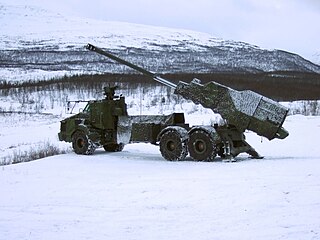
The Archer artillery system, or Archer – FH77BW L52, or Artillerisystem 08, is a Swedish self-propelled howitzer system. The main piece of the system is a fully automated 155 mm L52 (52-calibre-long) gun-howitzer and a M151 Protector remote-controlled weapon station mounted on a modified 6×6 chassis of the Volvo A30D all-terrain articulated hauler. The crew and engine compartment is armoured and the cab is fitted with bullet and fragmentation-resistant windows. The system also includes an ammunition resupply vehicle, a support vehicle, Bonus submunitions, and M982 Excalibur guided projectiles.
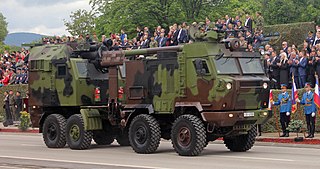
The Nora B-52 is a 155 mm self-propelled howitzer developed by Military Technical Institute and manufactured by Yugoimport SDPR in Velika Plana, Serbia.
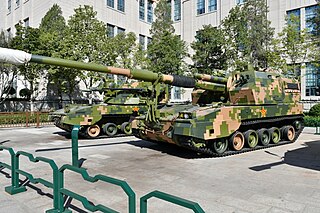
The PLZ-05 or the Type 05 is a 155 mm self-propelled howitzer developed by the People's Liberation Army of China to replace the Type 59-1 130 mm towed gun and Type 83 152 mm self-propelled gun. The PLZ-05 was officially unveiled at the Military Museum of the Chinese People's Revolution to mark the 80th anniversary of the PLA in July 2007, and first entered service with the PLA in 2008.

ATMOS is a 155 mm/52 calibre self-propelled gun system manufactured by Israeli military manufacturer Soltam Systems.

The AHS Krab is a 155 mm NATO-compatible self-propelled tracked gun-howitzer designed in Poland by Huta Stalowa Wola (HSW), by combining a heavily modified South Korean K9 Thunder chassis with a British BAE Systems AS-90M Braveheart turret with a 52-calibre gun produced by HSW and the Polish WB Electronics' Topaz artillery fire control system. "AHS" is not a part of the name, but Polish abbreviation of armatohaubica samobieżna - gun-howitzer, self-propelled.

The HM-41 is an Iranian 155 mm howitzer based on the KH179, which was imported from South Korea during the Iran–Iraq War. It has a 155 mm/39 caliber barrel with a muzzle brake to lessen the recoil.
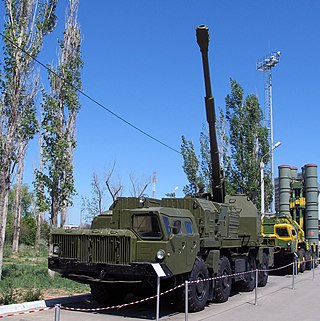
The A-222 Bereg is a Russian 130 mm self-propelled coastal artillery gun, which was developed in the 1980s and was first shown to the public in 1993 at an arms fair in Abu Dhabi.

The 2S35 Koalitsiya-SV is a Russian self-propelled gun first seen in public in 2015 during rehearsals for the Moscow Victory Day Parade. The 2S35 is expected to supplement and eventually replace the 2S19 Msta in the Russian Ground Forces.

EVA is a Slovak-made self-propelled howitzer, developed by Konstrukta Defence and publicly revealed in 2015. The EVA is based on a Tatra 815 6x6 truck, but the system can be also mounted on a 8x8 truck chassis. It is armed with a 155 mm / L52 howitzer and has a maximum firing range of 41 kilometres (25 mi) with ERFB-BB ammunition.
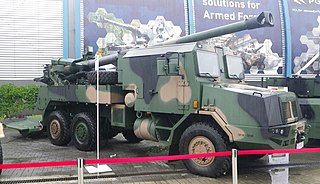
The AHS Kryl is a 155 mm NATO-compatible self-propelled wheeled howitzer designed in Poland by Centrum Produkcji Wojskowej Huta Stalowa Wola. It is a licensed copy of the Israeli ATMOS 2000 52-caliber gun mounted on a Polish Jelcz 663 armoured 6×6 chassis and integrating WB Electronics' "Topaz" artillery fire control system.

The Type 19 155 mm wheeled self-propelled howitzer is Japanese wheeled self-propelled gun. The vehicle is designed to replace Japan's inventory of FH70 towed howitzers.
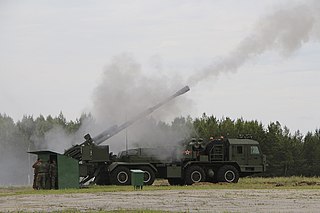
The 2S43 "Malva" is a 152 mm Russian self-propelled gun mounted on an 8x8 wheeled chassis.



















